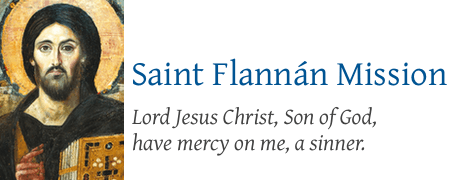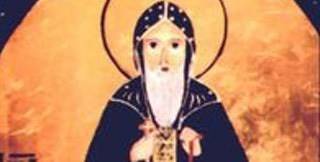In the Name of the Father and of the Son and of the Holy Spirit, one God. Amen. Dear beloved, let us remember Apostle Jason of the Seventy. May Apostle Jason pray for us.
As we read from St John 8:12-20, we are to follow the Light of the World, our Lord Jesus Christ. And yet, as our Lord admonished the young man to give up everything to the poor and then follow Him (St Matthew 19:21), do we literally strip everything we own and run off to the desert?
Not everyone is meant to be an ascetic hermit or monk in the scorching desert or the freezing icy forest. Many of us are meant to carry our crosses in the streets, in the cities, in the factories, and in the workplaces. Many of us are meant to have families and carry the crosses of sacrifice and love in this manner.
One of the desert saints, Coptic saint Abba John the Dwarf, is a good example to learn from.
Abba John said to his elder brother one day, ‘I should like to be free of all care, like the angels, who do not work, but ceaselessly offer worship to God.’ So he took off his cloak and went away into the desert. After a week he came back to his brother. When he knocked on the door, he heard his brother say, before he opened it ‘Who are you?’ He said, ‘I am John, your brother.’ But he replied, ‘John has become an angel, and henceforth he is no longer among men.’ Then the other begged him saying, ‘It is I.’ However, his brother did not let him in, but left him there in distress until morning. Then, opening the door, he said to him, ‘You are a man and you must once again work in order to eat.’ Then John made a prostration before him, saying, ‘Forgive me.’
Therefore, we are to labor, and to labor fully and labor fairly. And that is true for Orthodox clergy as well. We are to labor fully and fairly, and also to preach and spread the Gospel to those we have the privilege to be in conversation with (Acts 10:34-43). And therefore it is the same with the laity as well. We are to labor fully and fairly with prayers and love.
We, the Orthodox faithful, are the New Israel. We are the people of God, as long as we profess our faith in Him in repentance and prayers till our last breath is drawn. We are His chosen people not because we are special, but because we have professed His Son, Jesus Christ, as our Lord and Savior. God is as much merciful as He is impartial. He does not favor any race or people more than others (Galatians 3:28), as everyone of us is a precious creation of Him. He shows equal and infinitely abundant love for each and every one of us.
What then, should we do as the chosen people, given this privilege of a journey of pilgrimage?
It is about martyrdom. For some, they will carry their crosses to a glorious death of martyrdom and become saints of the Church. For most of us, we carry our crosses to our eventual natural death. This is living martyrdom, the lifelong journey of sacrifice (Psalm 50:1-5).
Living martyrdom is not easy. For some of us, we may live to a ripe old age of 100 or even more. For some others, we may live a shorter life. But no matter what age we will live until, our living martyrdom is about our love of God through our inner prayer and repentance, and a marathon we run until we are done.
The longer the marathon, and the closer we intend to draw near to God, the more obstacles the evil one will throw our way to trip us. We have three weapons of self-defense, repentance, the sign of the cross, and the prayer of the heart.
We repent with humility and tears because we love God, not because we are merely fearful of repercussions. We want to and desire to reconcile with God. That is why we repent. Repentance is the first step, and the most important step before we pray.
The cross is the most unconquerable weapon against the evil one, as Church father St John Chrysostom said in his commentary on 11 Thessalonians 2:6-7, that through the power of the cross of our Lord, Christian kings will reign until the Antichrist and bar the evil one’s proxy to power and will restrain lawlessness. By the same cross, Emperor Constantine put an end to the persecution of the Church. Therefore, as Orthodox faithful, we make the Sign of the Cross often, because it is a silent prayer unto God.
And joined to the sign of the cross is our prayer of the heart, which the hesychasts of old and desert fathers have taught us, that is said to be the embodiment of the entire Bible in a single sentence. This is the only prayer anyone can pray, without any barrier, at any time, in any space, even in silence.
Martyrdom is especially also a dialog with God, when it means that we listen more than we petition or talk. We talk a great deal in daily lives that we hardly listen, and it is the same with our journey towards God. As we read in 1 Samuel 15:22-23, our Lord delights in our obedience and listening to Him, which is even better than sacrifice.
Let us call upon the Holy Name of Christ our Lord and Savior often, in our daily inner prayerful journeys, “Lord Jesus Christ, Son of God, have mercy on me, a sinner”.
Let us close by praying the thanksgiving prayer:
It is truly meet to call thee blest, the Theotokos, ever blessed and most pure, and the Mother of our God. More honorable than the Cherubim, and more glorious than the Seraphim, without corruption thou gavest birth to God the Word: True Theotokos, we magnify thee.
O virgin Theotokos, rejoice; O Mary full of grace, the Lord is with thee. Blessed art thou among women, and blessed is the fruit of thy womb, for thou hast borne the Savior of our souls, Jesus Christ our Lord. Amen.
Fr Raphael+
Readings
1 Samuel 15:22-23
Psalm 50:1-5
John 8:12-20
Acts 10:34-4

